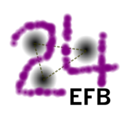Mr
Ivan Muzalevskii
(JINR)
The 7H isotope is the Golden Fleece to be searched by the RIB holders. Until the present moment only upper limits of its lifetime and ground state energy were estimated. Such unbound complicated five-body nuclear system, which has extremely large mass-to-charge ratio, lies far beyond the drip-line and has not been detected yet.
An experimental search for the 7H resonance was performed with the 2H(8He,3He)7H reaction. Beam of the 8He with energy of ~26AMeV provided by ACCULINNA-2 fragment separator interacted with the gaseous cryogenic deuterium target (6 mm thick at 27K and at 1 atm). The detector system was consisted of Si and CsI telescope detectors intended for detection of the recoil 3He and 3H emitted from 7H decay. Сompared with the previous works dedicated to 7H the main advantage and novelty of the used setup was the possibility to measure the angle and energy of the emitted tritium.
Events with a coincidence of detected 3He and 3H was considered as candidates for 7H event. The number of coincidences of the decay products allowed us to estimate the reaction cross-section. Measuring the spectra of 3He under the small angles allows to reconstruct the 7H missing-mass spectrum. The obtained angles and energies of 3He and 3H in coincidence gave a lot of informative angular correlations.
In the report we will present preliminary 7H missing-mass spectrum together with estimation of detection efficiency of the 7H and various angular correlations of reaction products (e.g. missing-mass spectrum with the angle of the emitted tritons). Simulations needed for data analysis has been performed within the ExpertRoot framework [1].
[1] http://er.jinr.ru/
Mr
Ivan Muzalevskii
(JINR)
Egor Ovcharenko
(Justus-Liebig-Universität Gießen)
Mr
Adilzhan Serikov
(Joint Institute for Nuclear Research)
Mrs
Aleksandra Swiercz
(Joint Institute for Nuclear Research)
Dr
Alexander Gorshkov
(Joint Institute for Nuclear Research)
Mr
Andrey Bezbakh
(Joint Institute for Nuclear Research)
Dr
Andrey Fomichev
(Joint Institute for Nuclear Research)
Mrs
Anh Quynh
(Joint Institute for Nuclear Research)
Mr
Bogumil Zalewski
(Joint Institute for Nuclear Research)
Mrs
Daria Kostyleva
(GSI Helmholtzzentrum Darmstadt, Germany)
Mr
David Biare
(Joint Institute for Nuclear Research)
Mrs
Elvira Gazeeva
(Joint Institute for Nuclear Research)
Dr
Evgeni Nikolskii
(Joint Institute for Nuclear Research)
Grzegorz Kaminski
(Flerov Laboratory of Nuclear Reactions, Joint Institute for Nuclear Research, 141 980 Dubna, Moscow region, Russia)
Prof.
Gurgen Ter-Akopian
(Joint Institute for Nuclear Research)
Prof.
Leonid Grigorenko
(Joint Institute for Nuclear Research)
Michail Kozlov
(The Laboratory of Information Technologies JINR)
Prof.
Mikhail Golovkov
(Joint Institute for Nuclear Research)
Mr
Patryk Szumkiewicz
(Joint Institute for Nuclear Research)
Mr
Pavel Sharov
(Joint Institute for Nuclear Research)
Mr
Piotr Plucinski
(Joint Institute for Nuclear Research)
Mr
Roman Slepnev
(Joint Institute for Nuclear Research)
Dr
Roman Wolski
(Joint Institute for Nuclear Research)
Dr
Sergei Stepantsov
(Joint Institute for Nuclear Research)
Dr
Sergey Belogurov
(Joint Institute for Nuclear Research)
Mr
Sergey Krupko
(Joint Institute for Nuclear Research)
Dr
Sergey Sidorchuk
(Joint Institute for Nuclear Research)
Vitaliy Schetinin
(The Laboratory of Information Technologies JINR)
Dr
Vratislav Chudoba
(Joint Institute for Nuclear Research)
Dr
Yulia Parfenova
(Joint Institute for Nuclear Research)
There are no materials yet.
